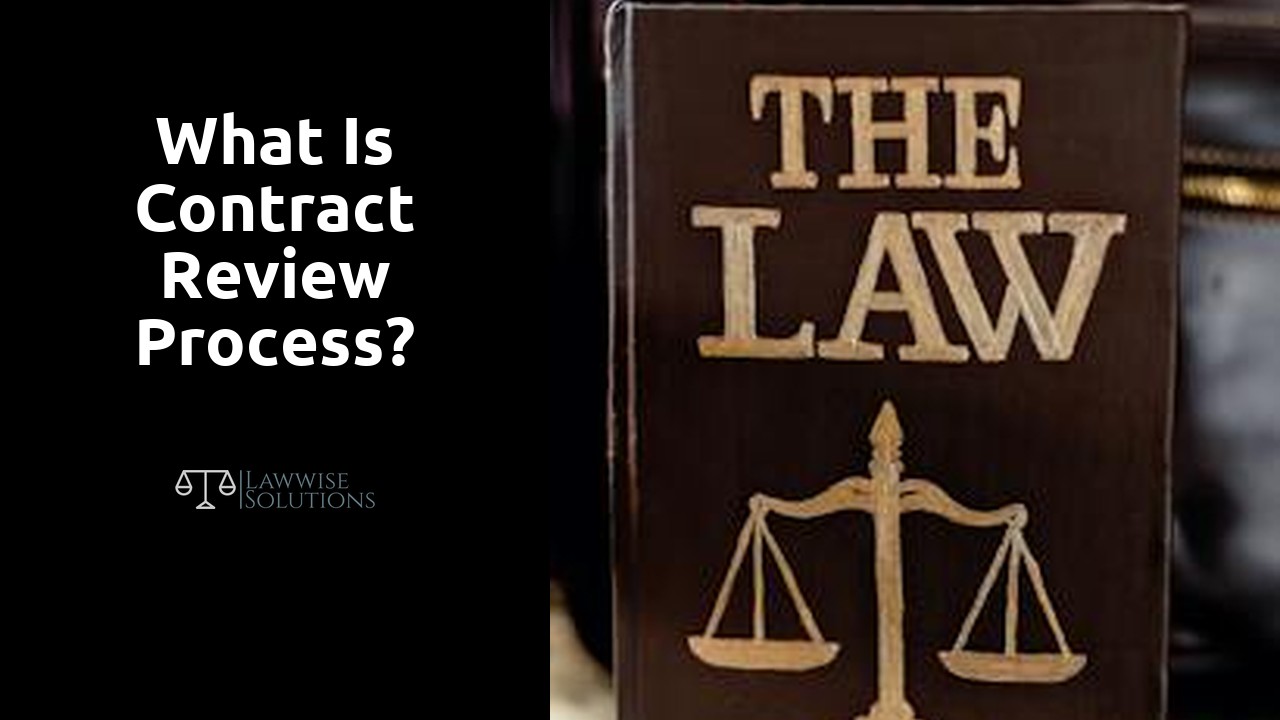What is contract review process?

Ensuring Compliance During the Contract Review Process
Ensuring compliance during the contract review process is paramount to mitigate risks and ensure legal obligations are met. It involves thorough scrutiny of each clause and provision to ensure alignment with legal standards and company policies. Contract drafting and review require a keen eye for detail to identify any discrepancies or potential areas of non-compliance.
Compliance throughout the contract review process is achieved through meticulous checks and systematic reviews. Legal experts play a pivotal role in assessing the legality and enforceability of the clauses within the contract. Any anomalies identified during the contract drafting and review stage need to be addressed promptly to prevent future legal disputes.
Verifying Adherence to Regulatory Requirements
Verifying adherence to regulatory requirements is a crucial aspect of the contract review process. It ensures that all legal standards and guidelines are met during the drafting and reviewing of contracts. Compliance with various regulatory requirements not only protects the interests of the parties involved but also minimizes the risk of legal disputes or penalties in the future. Contract drafting and review should be meticulous and thorough to ensure that the terms and conditions outlined in the contract align with industry-specific regulations and legal frameworks.
Failure to adhere to regulatory requirements can lead to potential legal ramifications and financial consequences for the organizations involved in the contract. Therefore, it is essential to conduct a comprehensive regulatory review to identify any potential gaps or inconsistencies in the contract draft. This step helps in mitigating risks and ensuring that the contract is legally sound and compliant before finalization. By verifying adherence to regulatory requirements, organizations can uphold their credibility, build trust with stakeholders, and safeguard their business interests in the long term.
Collaboration and Communication in Contract Review
Contract review is a crucial stage in the process of ensuring that all parties involved fully understand and agree to the terms laid out in the contract. Efficient collaboration and communication during this phase are vital to guarantee that the interests of all stakeholders are addressed. This involves effective communication between the legal team responsible for the Contract Drafting and Review and the various departments or individuals affected by the contract. By fostering open lines of communication and encouraging collaboration, potential misunderstandings can be minimized, and any discrepancies can be promptly addressed.
Moreover, clear communication within and between departments is essential to streamline the contract review process. Effective communication ensures that all parties are aware of their roles and responsibilities, facilitating a smooth and efficient review process. Regular updates and status reports on Contract Drafting and Review can help keep all stakeholders informed and engaged. By promoting open dialogue and fostering a culture of cooperation, organizations can enhance their contract review process and mitigate potential risks associated with misunderstandings or misinterpretations.
Facilitating Smooth Interdepartmental Coordination
Facilitating smooth interdepartmental coordination is crucial during the contract review process. By fostering open communication channels between different departments, organizations can ensure that all stakeholders are aligned on the key terms and conditions within the contract. This collaboration not only enhances the efficiency of the review process but also mitigates the risk of misunderstandings or delays in Contract Drafting and Review.
Moreover, regular updates and progress reports among departments help to track the status of each contract under review. This transparency promotes accountability and allows for timely resolution of any discrepancies or issues that may arise during the Contract Drafting and Review process. By encouraging active participation and involvement from all departments involved, organizations can streamline the contract review process and optimize overall efficiency.
Incorporating Feedback for Continuous Improvement
Feedback plays a crucial role in enhancing the efficiency and efficacy of the contract review process. It offers valuable insights into areas that require attention and improvement. Incorporating feedback from various stakeholders involved in Contract Drafting and Review ensures that the process aligns with the organization's objectives and meets the desired quality standards. By actively seeking feedback, organizations can address any bottlenecks or inconsistencies in the contract review process promptly, leading to better outcomes and minimized risks.
Moreover, soliciting feedback allows organizations to adapt to changing regulatory landscapes and business requirements effectively. Periodically reviewing feedback gathered from contract reviewers, legal counsels, and other relevant parties helps in identifying emerging trends or concerns. By incorporating these insights back into the contract review process, organizations can optimize their procedures, streamline workflows, and ultimately enhance the overall quality of Contract Drafting and Review.
FAQS
Why is a contract review process important?
A contract review process is crucial to ensure that all contracts comply with legal and regulatory requirements, protect the interests of the parties involved, and minimize risks associated with the agreement.
Who is typically involved in the contract review process?
The contract review process usually involves legal professionals, contract managers, subject matter experts, and relevant stakeholders from different departments within an organization.
How does collaboration and communication play a role in the contract review process?
Collaboration and communication are essential in the contract review process to ensure that all parties are aligned on the terms and conditions of the contract, address any discrepancies, and facilitate a smooth review and approval process.
How can feedback be incorporated for continuous improvement in the contract review process?
Feedback from stakeholders involved in the contract review process should be collected and analyzed to identify areas for improvement, implement necessary changes, and enhance the efficiency and effectiveness of the process over time.
What steps should be taken to monitor and update the contract review process?
Regular monitoring of the contract review process, tracking key metrics, and conducting periodic reviews are important to identify bottlenecks, address any issues that arise, and make necessary updates to improve the overall process.